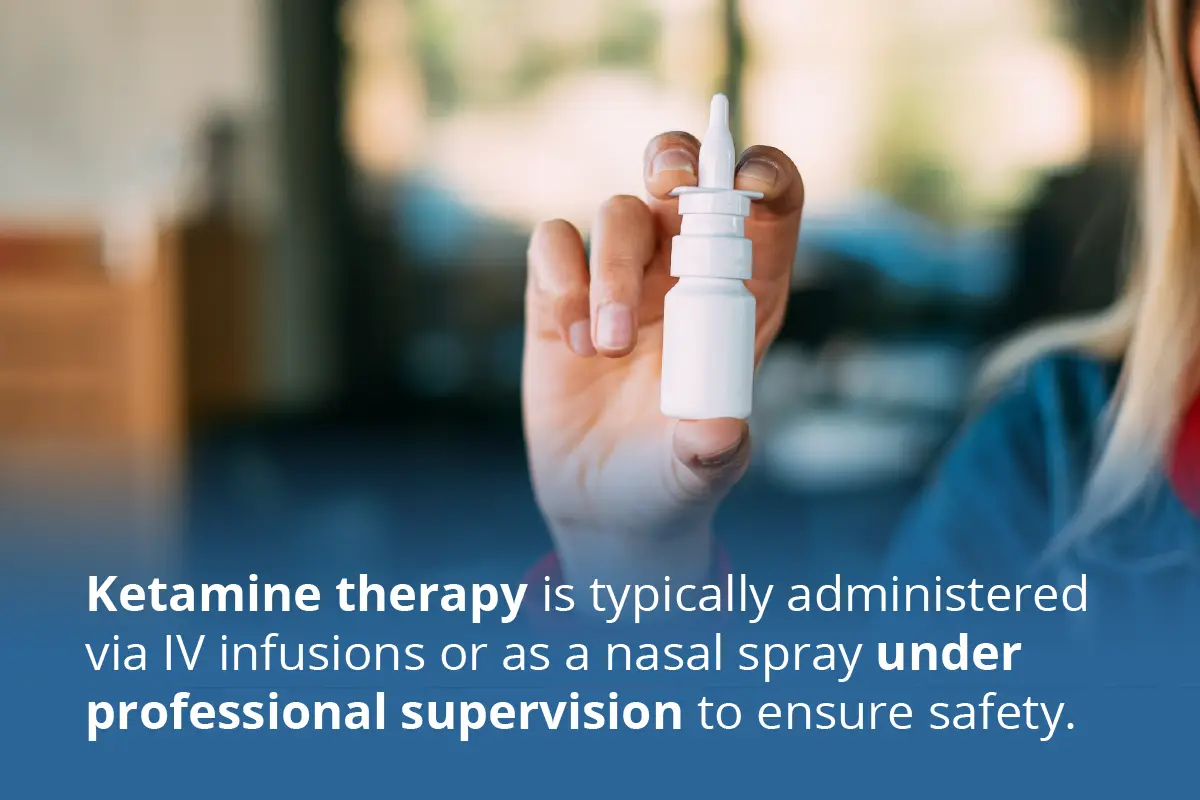Ketamine Therapy: Truths You Need to Know
Other Categories

Ketamine therapy, a novel psychiatric approach, utilizes the anesthetic drug ketamine to treat conditions like depression and PTSD. Administered in controlled settings, it influences brain receptors, often providing rapid relief.
Despite potential benefits, drawbacks exist. Misuse may lead to dependence. It’s crucial to undergo therapy only under professional supervision. As with any medical intervention, understanding the potential positives and negatives of ketamine therapy is essential for informed decision-making.
Key Takeaways
Ketamine therapy employs the anesthetic drug ketamine to treat conditions like depression and PTSD. Here’s what you need to know:
-
- Ketamine, originally an anesthetic, now finds application in mental health treatment.
-
- Patients may experience short-term side effects that usually subside shortly after the infusion.
-
- Post-therapy recovery and follow-ups contribute to the overall success of the treatment.
What is Ketamine?
Ketamine is a medication originally developed in the 1960s as a fast-acting anesthetic used in surgical and emergency settings. Classified as a dissociative anesthetic, it alters perception, consciousness, and sensation while providing effective pain relief and sedation.
In recent decades, researchers have discovered ketamine’s unique effects on the brain—particularly its influence on glutamate, a neurotransmitter linked to mood regulation and neural plasticity. These discoveries have led to the development of ketamine therapy as a promising treatment for mental health conditions such as depression, PTSD, and anxiety disorders.
Unlike traditional antidepressants that may take weeks to become effective, ketamine often produces noticeable improvements in symptoms within hours or days, especially for individuals who haven’t responded to conventional treatments.
Ketamine Therapy: From Anesthetic to Mental Health Intervention
Today, ketamine is administered in carefully monitored settings, typically as an IV ketamine infusion or via a nasal spray. Clinics providing ketamine therapy are becoming increasingly common, offering treatment options tailored to each patient’s mental health needs.
This therapy has been especially effective for people with treatment-resistant depression, offering fast relief when other medications have failed. While still considered off-label in many cases, the expanding body of research has made ketamine an accessible and hopeful option in psychiatric care.
Ketamine Infusion Therapy: How It Works
Ketamine infusion therapy involves administering controlled doses of ketamine intravenously in a medical office or clinical environment. The process usually includes a series of infusions spaced over several weeks, accompanied by ongoing psychological assessments and support.
Clinics specializing in this treatment focus on safety, personalized care, and outcome tracking to ensure effective symptom relief.
Who Is a Good Candidate for Ketamine Therapy?
Ketamine therapy is generally considered for individuals who have not found relief with traditional therapies. This includes people diagnosed with:
-
Major depressive disorder (MDD)
-
Post-traumatic stress disorder (PTSD)
-
Chronic anxiety
-
Suicidal ideation
However, it’s important to determine who is not a good candidate for ketamine therapy. Individuals with a history of schizophrenia or other psychotic disorders, uncontrolled high blood pressure, or substance use disorders may not be eligible. A thorough medical and psychological evaluation is essential to ensure safety and maximize treatment success.
What to Expect During Ketamine Therapy
During a ketamine infusion session, patients are monitored closely by healthcare providers. Sessions are typically administered in a calm, supportive environment to reduce stress and promote relaxation.
Common short-term side effects may include:
-
Nausea
-
Dizziness or disorientation
-
Mild hallucinations or dissociation
-
Changes in heart rate or blood pressure
These effects are usually temporary and subside shortly after the session. Long-term effects and optimal treatment frequency are still areas of ongoing research.
Ketamine Therapy for Depression and PTSD
Ketamine therapy for depression has shown substantial promise, particularly in cases where other treatments have failed. Patients often experience rapid mood improvements, sometimes within 24–48 hours of the first session.
In cases of PTSD, ketamine may help reduce the emotional intensity of traumatic memories, allowing for more effective processing in therapy. Its action on glutamate pathways helps promote neuroplasticity, giving patients a window of relief in which meaningful healing work can occur.
Ketamine Therapy Side Effects and Considerations
Like all medical treatments, ketamine therapy comes with potential side effects. These may include:
-
Elevated heart rate or blood pressure
-
Visual or auditory disturbances
-
Short-term confusion or grogginess
-
Emotional vulnerability after treatment
Therapy should always be conducted by a qualified healthcare provider, and patients should engage in open conversations about benefits, risks, and expectations throughout the course of care.
Ketamine Withdrawal: What You Need to Know
In medically supervised therapy, ketamine is not typically associated with physical withdrawal. However, when used frequently outside of medical guidance—especially in recreational settings—there can be psychological withdrawal effects.
Potential Ketamine Withdrawal Symptoms
-
Cravings or desire to reuse ketamine
-
Irritability or anxiety
-
Sleep disturbances
-
Fatigue or low motivation
-
Trouble concentrating
These long-term and short-term symptoms are more likely in individuals who use ketamine at high doses over time without clinical oversight. In structured therapy, the risk of withdrawal is minimal, thanks to spaced dosing and professional monitoring.
Providers carefully evaluate patients before, during, and after treatment to ensure any signs of psychological dependence are identified early and addressed appropriately.
Conclusion
Ketamine therapy represents a powerful and innovative shift in the treatment of depression, PTSD, and other challenging mental health conditions. With its rapid-acting effects and unique brain mechanisms, it offers new hope to individuals who have struggled with conventional treatment methods.
Still, ketamine is not a one-size-fits-all solution. Eligibility, side effects, risks of misuse, and long-term outcomes must be carefully considered in partnership with a qualified healthcare provider. With the right guidance, ketamine infusion therapy can become a valuable part of a holistic mental health plan.
Frequently Asked Questions
Navigating the journey to recovery can bring up many questions. Below are some of the most commonly asked questions about our services. If you need more information or have additional questions, we are only a phone call away.
What exactly is Ketamine Therapy, and how does it work?
Ketamine therapy, a psychiatric treatment gaining popularity, involves administering the medication ketamine to address conditions like depression and PTSD. It works by affecting specific receptors in the brain, bringing about rapid relief.
The therapy is administered in controlled settings, typically through an intravenous (IV) infusion or nasal spray. Unlike traditional antidepressants, ketamine’s impact is faster, often providing relief when other treatments fail.
Though promising, it’s vital to consider potential short-term side effects, such as disorientation. Professional supervision and discussions with healthcare providers are essential to assess individual risks and benefits before embarking on ketamine therapy.
Is Ketamine Therapy safe, and what are the potential side effects?
Ketamine therapy, involving the FDA-approved drug S-ketamine, shows promise for severe depression, with a single dose targeting glutamate receptors. Studies suggest benefits in alleviating depression symptoms, especially in those unresponsive to selective serotonin reuptake inhibitors.
However, long-term effects and safety are still under scrutiny. The FDA supports supervised ketamine use in healthcare settings.
Potential side effects include altered perception, dissociation, and transient blood pressure changes.
Though rare, misuse can lead to harm or death. Ongoing clinical studies aim to better understand ketamine’s role in mental health disorders, stressing cautious, monitored use to ensure patient well-being.



Other Categories Alcohol Use Mental Health Drug Use Recovery Key Findings from the Study Only

Other Categories Alcohol Use Mental Health Drug Use Recovery Trends in Substance Treatment America’s substance

Other Categories Alcohol Use Mental Health Drug Use Recovery Ketamine therapy has become famous for

Other Categories Alcohol Use Mental Health Drug Use Recovery Cognitive Behavioral Therapy (CBT) and Dialectical

Other Categories Alcohol Use Mental Health Drug Use Recovery Mental health and substance abuse recovery
Have Questions? Let’s Talk!
Let’s talk about what’s going on — no judgment. (We’ve been there before ourselves). No one will know you inquired and there is no commitment to call.
Need someone to talk to? We’re here when you need it most.
There’s no obligation to get your questions answered.
No one will ever know you inquired.
